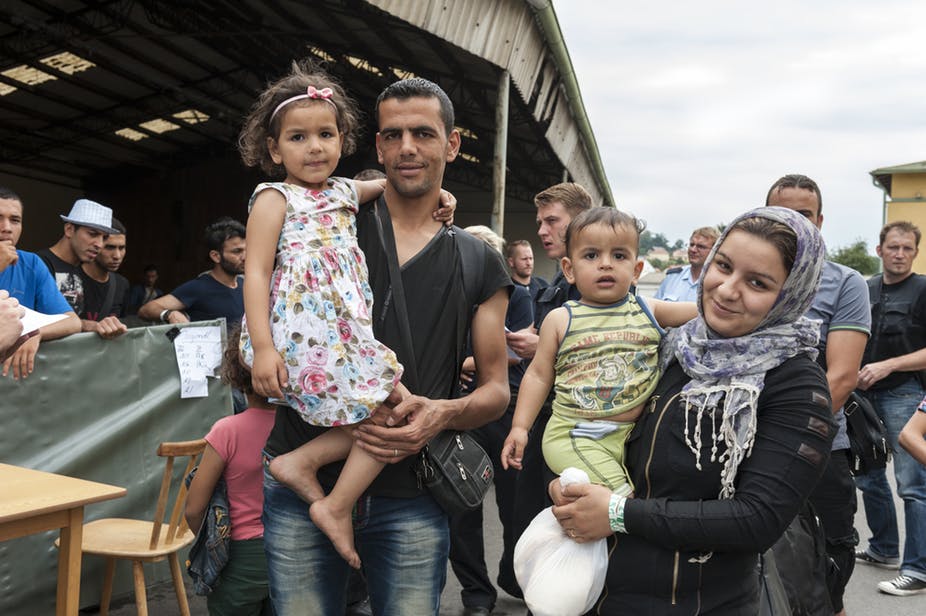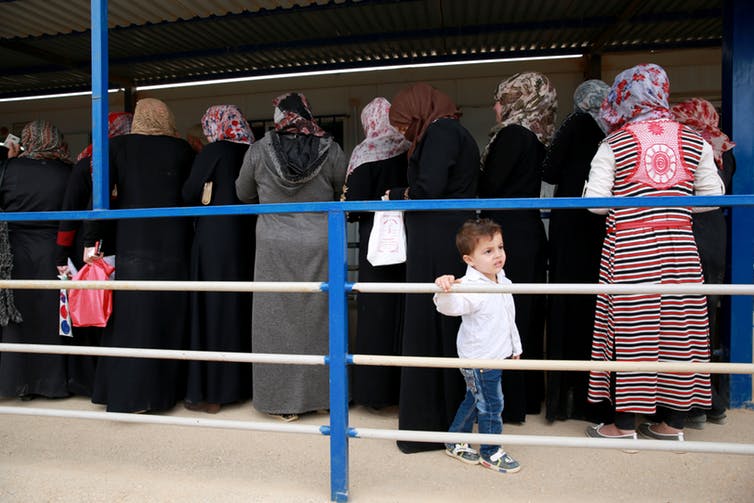How to overcome religious prejudice among refugees
Author
Kat Eghdamian, Theconversation, March 2, 2018
Kat Eghdamian, Theconversation, March 2, 2018
I met
Amer *, a young Syrian Druze refugee, at a smoke-filled cafe in the Berlin
borough of Neukölln.
“Before the war,” he told me, “no one would care if you were a Muslim,
Christian, Druze, or anything else. I am Syrian. We are all Syrian. But now,
people want to know what your religion is and then they will act differently
towards you. This is the problem.”
Amer *, a young Syrian Druze refugee, at a smoke-filled cafe in the Berlin
borough of Neukölln.
“Before the war,” he told me, “no one would care if you were a Muslim,
Christian, Druze, or anything else. I am Syrian. We are all Syrian. But now,
people want to know what your religion is and then they will act differently
towards you. This is the problem.”

Syrian
refugees arrive to start a new life in Germany.
refugees arrive to start a new life in Germany.
I’ve
heard many statements like these over the course of my research on the
experiences of Syrian refugees from religious minority backgrounds. Whether in Turkey,
Jordan,
or now in Germany, where I am currently during research, I’m finding a growing
divide among Syrian refugees on the basis of religion – or of sectarianism.
heard many statements like these over the course of my research on the
experiences of Syrian refugees from religious minority backgrounds. Whether in Turkey,
Jordan,
or now in Germany, where I am currently during research, I’m finding a growing
divide among Syrian refugees on the basis of religion – or of sectarianism.
There has
been much attention across Europe on the religious intolerance and prejudices
held by far-right
political parties and other groups towards
refugees. But religious prejudice is also a feature and challenge of
relations between refugees – and this must be better understood if it is to be
overcome.
been much attention across Europe on the religious intolerance and prejudices
held by far-right
political parties and other groups towards
refugees. But religious prejudice is also a feature and challenge of
relations between refugees – and this must be better understood if it is to be
overcome.
Attacks
in refugee centres
in refugee centres
In 2016,
at a Düsseldorf refugee centre, lunch was served during the Ramadan month of
fasting. A dispute ensued and two refugees burned down the hall in
protest, later standing
trial for the religiously motivated crime. Later in 2016, a report
revealed other accounts of attacks on religious minority refugees, particularly
against converts to Christianity, in refugee centres across Germany.
at a Düsseldorf refugee centre, lunch was served during the Ramadan month of
fasting. A dispute ensued and two refugees burned down the hall in
protest, later standing
trial for the religiously motivated crime. Later in 2016, a report
revealed other accounts of attacks on religious minority refugees, particularly
against converts to Christianity, in refugee centres across Germany.
People I
interviewed told me of harassment they had experienced from other refugees,
sometimes for religious reasons. Often the accounts may seem subtle – from a
young Christian woman questioned by a Muslim woman as to why she was not
wearing a veil. Or a Muslim man telling another Muslim that he is “kafir” (an
infidel) for eating pork. Those refugees who have faced such harassment,
however, experience significant discomfort and insecurity from these incidents.
interviewed told me of harassment they had experienced from other refugees,
sometimes for religious reasons. Often the accounts may seem subtle – from a
young Christian woman questioned by a Muslim woman as to why she was not
wearing a veil. Or a Muslim man telling another Muslim that he is “kafir” (an
infidel) for eating pork. Those refugees who have faced such harassment,
however, experience significant discomfort and insecurity from these incidents.
In other
cases, refugees in Jordan, Turkey, and Germany told me they had experienced
overt acts of intolerance, including physical attacks for wearing a religious
symbol, such as a cross, or for not attending prayer services.
cases, refugees in Jordan, Turkey, and Germany told me they had experienced
overt acts of intolerance, including physical attacks for wearing a religious
symbol, such as a cross, or for not attending prayer services.

Syrian
refugees wait at Zaatari refugee camp in Jordan. Andre Pain/EPA
refugees wait at Zaatari refugee camp in Jordan. Andre Pain/EPA
Muslim
refugees have also been subjected to harassment and discrimination by both members of
host societies and other refugees. Ambar*, a young Syrian Christian
refugee woman living in Kreuzberg, Berlin, recounted an incident that happened
when she first arrived in Germany and lived in a refugee centre.
refugees have also been subjected to harassment and discrimination by both members of
host societies and other refugees. Ambar*, a young Syrian Christian
refugee woman living in Kreuzberg, Berlin, recounted an incident that happened
when she first arrived in Germany and lived in a refugee centre.
This one
time, I wanted to come inside a building and the guard just let me in. Behind
me was a girl wearing a hijab though. She tried to walk through too, just like
me, but she was yelled at and told to come back. Then they checked her bag and
everything. So, in this moment, I thought, wow, she could hate me. Because we
get treated differently. I will never forget this moment and how she looked at
me. She was crying. I had no choice but to just walk away.
Some of
the hosts and refugees I interviewed also expressed intolerance towards and
about Syrian Muslim refugees. These included false assumptions about their
levels of education and social class, and their likelihood to commit violence
or terrorism. Others simply presumed Syrian Muslim refugees would be
politically aligned to the conservative Salafi branch of Islam.
the hosts and refugees I interviewed also expressed intolerance towards and
about Syrian Muslim refugees. These included false assumptions about their
levels of education and social class, and their likelihood to commit violence
or terrorism. Others simply presumed Syrian Muslim refugees would be
politically aligned to the conservative Salafi branch of Islam.
There has
also been a tendency among Muslim refugees to presume that others have certain
ideological and religious identities. A former Ismaili Muslim refugee, who has
turned atheist, spoke to me in Berlin about the harassment he experienced in a
refugee centre for not attending prayers and for choosing not to fast during
Ramadan. “Yes, I am from Raqqa, but people think that must mean I am Muslim
and, even more, they think I must be with Daesh (Islamic State)”, he said. “But
people forget, my city has been destroyed. I am not with any group, and I no
longer believe (in God).”
also been a tendency among Muslim refugees to presume that others have certain
ideological and religious identities. A former Ismaili Muslim refugee, who has
turned atheist, spoke to me in Berlin about the harassment he experienced in a
refugee centre for not attending prayers and for choosing not to fast during
Ramadan. “Yes, I am from Raqqa, but people think that must mean I am Muslim
and, even more, they think I must be with Daesh (Islamic State)”, he said. “But
people forget, my city has been destroyed. I am not with any group, and I no
longer believe (in God).”
Intolerance
is not inevitable
is not inevitable
In both
Jordan and Germany, I’ve heard suggestions, especially from a few Christian
organisations working with refugees, that it would be better, safer, and easier
if refugees were separated on the basis of religion. This is a dangerous
suggestion and thankfully, rarely implemented. Other than in cases of immediate
safety and protection needs, separating refugees solely on the basis of
religion – whether in refugee camps, centres or elsewhere – is an assured way
of exacerbating differences and entrenching sectarian tensions.
Jordan and Germany, I’ve heard suggestions, especially from a few Christian
organisations working with refugees, that it would be better, safer, and easier
if refugees were separated on the basis of religion. This is a dangerous
suggestion and thankfully, rarely implemented. Other than in cases of immediate
safety and protection needs, separating refugees solely on the basis of
religion – whether in refugee camps, centres or elsewhere – is an assured way
of exacerbating differences and entrenching sectarian tensions.
Some
refugees themselves now believe that there is no choice but to live separately
from other refugees of different religious backgrounds. But this is based on a
perpetuated falsehood that different religious identities are inevitably
intolerant of each other. This is a divisive narrative that is being misused
and manipulated. Such a misconception lays the groundwork for incitement of
hatred and the dire consequences that come with it.
refugees themselves now believe that there is no choice but to live separately
from other refugees of different religious backgrounds. But this is based on a
perpetuated falsehood that different religious identities are inevitably
intolerant of each other. This is a divisive narrative that is being misused
and manipulated. Such a misconception lays the groundwork for incitement of
hatred and the dire consequences that come with it.
There is
a breadth of diversity in Syria and among Syrian refugees – from the moderate
Sunni who chooses not to observe the fast to the Ismaili who is an atheist.
Religion may be an important factor for some and entirely irrelevant to
another.
a breadth of diversity in Syria and among Syrian refugees – from the moderate
Sunni who chooses not to observe the fast to the Ismaili who is an atheist.
Religion may be an important factor for some and entirely irrelevant to
another.
To
counteract prejudice, hosts and refugees from different backgrounds must mix
together more. They should share their experiences and be given opportunities
to create and practice solidarity. This is not a naive ideal but a sorely
needed practice – and there are some examples of it working
positively for refugees.
counteract prejudice, hosts and refugees from different backgrounds must mix
together more. They should share their experiences and be given opportunities
to create and practice solidarity. This is not a naive ideal but a sorely
needed practice – and there are some examples of it working
positively for refugees.
Intolerance
among different groups of people should be treated as an abnormality, not an
inevitability. There is nothing inevitable about Syrian refugee tensions – let
alone other relations between refugees from different countries and
backgrounds. There is no predisposition to violence or hatred by any group of
people – and any such assumption must be overturned.
among different groups of people should be treated as an abnormality, not an
inevitability. There is nothing inevitable about Syrian refugee tensions – let
alone other relations between refugees from different countries and
backgrounds. There is no predisposition to violence or hatred by any group of
people – and any such assumption must be overturned.
* Names
have been changed to protect identities.
have been changed to protect identities.


